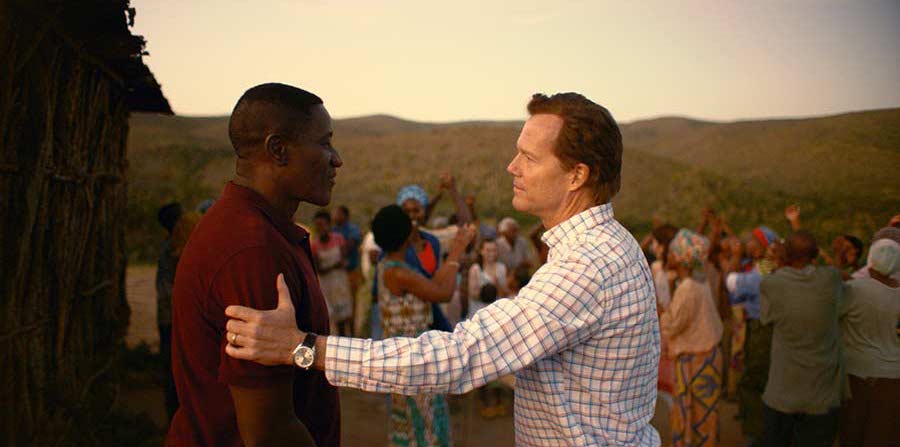Film Review: ‘Beautifully Broken’
By Joe Leydon
LOS ANGELES (Variety.com) – Solidly crafted and intelligently inspiring, “Beautifully Broken” skillfully entwines three narratives about faith, forgiveness, and fortuitous interconnections in a drama that likely will receive a warm reception from audiences with a taste for evangelical entertainment. Director Eric Welch and his co-writers attempt a tricky balancing act here, comparing and contrasting the struggles of two African families affected by the 1994 Rwandan Genocide with crises that disrupt a well-to-do white family in Nashville. To their considerable credit, the filmmakers avoid virtually all of the clichés common to formulaic stories of “white saviors” and “magical Negroes” while treating their characters, and their audience, with due respect.
The movie begins during the early days of the Rwandan Genocide, as murderous bands of gun- and machete-wielding Hutu militia hunt and slaughter their Tutsi neighbors and co-workers. William Mwizerwa (Benjamin A. Onyango), a devoutly religious Tutsi manager at a coffee export firm, barely avoids being added to the body count while fleeing with his wife and daughter. Meanwhile, in another part of Rwanda, Mugenzi (Bonko Khoza), a Hutu farmer, is separated from his own wife and daughter when he is forced to join one of the militia units.
For Randy Hartley (Scott William Winters), a successful Nashville businessman, the Rwandan Genocide is — initially, at least — nothing more than an occasionally disconcerting news item on cable TV. A few years after the slaughter, however, his interest increases exponentially as he becomes involved through his church with a Rwandan refugee program, which brings him into contact with William, and his teen daughter Andrea (Emily Hahn) begins up a pen-pal correspondence with Umuhoza (Ditebogo Ledwaba), Mugenzi’s daughter.
When she isn’t writing her Nashville friend, Umuhoza devotes much of her time praying for the return of her father, who remains imprisoned for his role in the Hutu militia while Umuhoza and her mother Tezan (Sibulele Gcilitshana) continue to work their small farm. William, too, frequently offers humble entreaties to God, seeking aid and comfort as he wades through acres of bureaucratic red tape so that his wife Ebraille (Eva Ndachi) and their daughter Aimee (Jessica Obilom) can leave a refugee camp and join him in Nashville.
In sharp contrast, Randy is the one whose faith is temporarily undermined by self-doubt, when the normally cheery and vivacious Andrea inexplicably turns sullen and rebellious, and is arrested for possession of drugs. What Randy and his wife Darla (Caitlin Nicol-Thomas) don’t know — because Andrea is too ashamed to tell them — is that she was sexually assaulted by a stranger during a July 4 outing with her friends, leaving her traumatized and driven to bad behavior and worse companions.
Welch displays admirable restraint while depicting the sexual assault and the Rwanda violence, yet still manages to convey the full horrific impact of both. He and his scriptwriters borrow a few pages from the playbook of French filmmaker Claude Lelouch while employing convenient coincidences and other narrative stratagems to forge connections (and re-connections) between disparate characters. And yet, like Lelouch at his best, they are able to make even the most improbable events in their storyline — which, not incidentally, is based on real-life events — play more like logical transitions than arrant contrivances. The movie pushes too hard only when members of the more-than-competent cast are forced to deliver clusters of flat, on-the-nose dialogue to indicate and underscore major plot points. Fortunately, these clusters are relatively infrequent distractions.
“Beautifully Broken” enthusiastically and unabashedly celebrates the power of faith and forgiveness, and the potential for reconciliation and redemption. But it never comes across as simplistic (or simple-minded) in its boundless optimism. Rather, the movie is dramatically and emotionally satisfying because of its repeated insistence that, because this world and the people in it are what they are, placing faith in God actually can be viewed as an act of defiance. Which is probably why they call it “faith,” not “certainty.”
(Note: “Beautifully Broken” was filmed by DP James King on locations in Port Alfred, South Africa, and Baton Rouge, La., that capably double for Rwanda and Nashville.)

